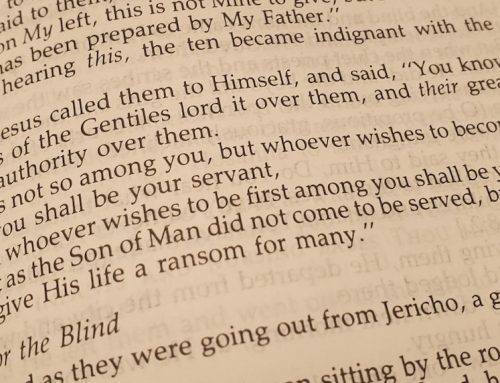Do you believe in love? Before you dismiss this as a trite 80’s song, think about it from a Biblical perspective. One of the really interesting things about God’s love is that we have to believe it:
1 John 4:16 – So we have come to know and to believe the love that God has for us.
This makes so much sense, when you think about it. Consider a father who loves his child deeply, and wants only the best for her. He raises her in love, corrects her when she’s wrong, and teaches her how to be a good adult. But during those teen years, isn’t it true that a parent’s love is sometimes not felt? It’s there. It’s being displayed. But it’s not being believed. It’s being misunderstood, mistrusted, or mistaken altogether for something else.
Most parents reading this are shaking their heads “yes.” There might be a teen or two reading this who disagrees, but give it a few years and you’ll understand better what I’m saying. Love can be poured out, but the object of our love has the option of choosing to disbelieve it.
But John says “we have come to know and to believe the love that God has for us.” We have come to know it. That means there was a time when we didn’t know it, and coming to know it was a process.
But we have also come to believe it. How do you “believe” God’s love? It’s easier in theory than in practice, but it takes setting aside the mistrust we might have learned, and accepting the fact that God’s desire—his heart—is to love you and know you. God is a loving father who wants a good relationship with his son or daughter, not a dysfunctional one. Why else would he describe himself as a good father? And why else would so many believers around the world describe God as a Good, Good Father? Has it ever occurred to you that maybe they’re on to something?
It won’t take long to read the entire book of 1 John to get the full context of this brash statement that there is no fear in love, but in the interest of space, let’s just take a look at a snippet:
1 John 4:7-21 – Beloved, let us love one another, for love is from God, and whoever loves has been born of God and knows God. 8 Anyone who does not love does not know God, because God is love. 9 In this the love of God was made manifest among us, that God sent his only Son into the world, so that we might live through him. 10 In this is love, not that we have loved God but that he loved us and sent his Son to be the propitiation for our sins. 11 Beloved, if God so loved us, we also ought to love one another. 12 No one has ever seen God; if we love one another, God abides in us and his love is perfected in us.
13 By this we know that we abide in him and he in us, because he has given us of his Spirit. 14 And we have seen and testify that the Father has sent his Son to be the Savior of the world. 15 Whoever confesses that Jesus is the Son of God, God abides in him, and he in God.
16 So we have come to know and to believe the love that God has for us. God is love, and whoever abides in love abides in God, and God abides in him. 17 By this is love perfected with us, so that we may have confidence for the day of judgment, because as he is so also are we in this world. 18 There is no fear in love, but perfect love casts out fear. For fear has to do with punishment, and whoever fears has not been perfected in love. 19 We love because he first loved us. 20 If anyone says, “I love God,” and hates his brother, he is a liar; for he who does not love his brother whom he has seen cannot[a] love God whom he has not seen. 21 And this commandment we have from him: whoever loves God must also love his brother. (ESV)
Drawing from my own experiences as a father, I have to acknowledge that there are times when instilling a healthy fear into younger kids especially is essential to keeping them safe. We all needed to have some fear of the consequences of our behavior; like running out into the street, or disappearing in a crowded place where bad people might be.
But if our entire relationship with our parents is based on fear of consequences rather than knowing and believing that they love us, that’s what’s called a dysfunctional home. As a foster family, my wife and I have spent years trying to pick up the pieces in the lives of kids who have had the trauma of not being raised in a loving home. We form our perception of the world at a very young age, and it is difficult to convince youth to trust adults enough to actually believe they are loved when their experiences teach them to the contrary.
Is it any different between us and God? If our (mis)understanding of him is formed at a young age, how hard is it to convince ourselves to believe that he really is the God of love he says he is? Doesn’t that seem a little too good to be true?
How hard is it to “come to know and to believe the love that God has for us?” And how hard is it to expel the fear that we learned at a young age in place of that love?
But for those who find themselves in that situation, the parent analogy may be your lifeline to know and believe the love that God has for you again. Because if your relationship with your child, if you have one, is not one of controlling them through fear, but persuading them through love, you have what you need to understand your relationship with the God of the universe. And now it can be built, as it should be, on love, not fear. But first you must come to know and believe the love God has for us.






no comments!! mabe the fear of god is more of a concern cause of all the surmising, false accusations, & murrmurring goin on
Or maybe there's a natural ebb and flow to conversations in a forum like this. I have no interest in "evil surmising," falsely accusing anyone, or "murmuring." If you can point to where I've done any of those things, please post a link. I've always made it clear that I want nothing but factually correct information on this blog.
If you want to read more on these subjects, you can check out these links on surmising, false accusations, and murmuring.
God bless.
well i guess the the ebb tide has gone out on this one and flow went down the drain. and mabe its all them peoples that has been flappin their mouths for a while with all there grunts and groans and its cought up with em
So you're saying the church's fear and intimidation tactics are working to silence dissent?
I rather believe, Kevin, their 'good consciences toward God' prevailed.
I was taking an english class so I did not come across as a fool.
Can you point to anything I've written that is in bad faith…disingenuous…overly provocative…false…or even unintentionally incorrect?
You come in here and make accusations, but I have yet to see any specific examples of anything I've written that is remotely unchristian. I'm not saying I'm perfect, I'm admitting that I'm not, and that I want to be corrected if I'm wrong. So please, correct me on something specific.
In love, Kevin
Well Anonymous 5:27 I am not discouraged by your comments. I hope that by shining the light of day on the Stanton Churches of Christ abusive ways that I have embarrassed them enough that they have stopped their wicked ways. I have seen the child abuse first hand, both in Bible class and in private homes, and the hatred that builds up in the child from it. I have seen the condoning of fornication and adultery by a wicked preacher and the destruction of families that come from it. I have seen the emptying of babes bank accounts, and taking… Read more »
"I rather believe, Kevin, their 'good consciences toward God' prevailed." No, I for one, don't live on here. What I have found interesting that usually when people choose not to see the truth, for what it is, they call those who point out being the ones in the wrong. It saddens me to see how Christians, people of God, can mistreat other Christians, who are also the people of God. For the longest time I thought I was the only one who felt the I did because of the treatment the teachers and other Christians were dealing out. After I… Read more »
I have heard these words before; from D.S. When you call attention to his bad behavior he responds with: "you just want to say something" and avoids any responsibility for his actions. The last act (and his greatest power) is the act of rejection. I have watched DS reject members at four days after baptism because they objected to his yelling and screaming at the congregation. If a bully cannot bully you, they will then reject you. Do not think you are safe because the bully is not currently harassing you, your turn will come, no one is safe from… Read more »